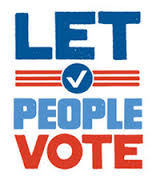 The Fifth Circuit Court of Appeals ruled on July 20 that the Texas voter identification law is unconstitutional, in violation of the federal Voting Rights Act. The Court found that the law had a discriminatory effect on black and Latino voters because they disproportionately lack the forms of identification mandated by the law: government-issued photo identification documents such as a driver’s license, passport, military ID card, or concealed-handgun license.
The Fifth Circuit Court of Appeals ruled on July 20 that the Texas voter identification law is unconstitutional, in violation of the federal Voting Rights Act. The Court found that the law had a discriminatory effect on black and Latino voters because they disproportionately lack the forms of identification mandated by the law: government-issued photo identification documents such as a driver’s license, passport, military ID card, or concealed-handgun license.
The Court remanded the case to the district court to find a remedy that “disrupts voter identification rules for the 2016 election season as little as possible, yet eliminates” the law’s discriminatory effect on minority voters and accommodates voters who face hardships in obtaining the necessary documents. The district court was also directed on remand to determine whether Texas legislators acted with a discriminatory purpose in passing the law in 2011 – although the trial judge was advised to wait until after the November election to make a decision on that issue.
The day before, on July 19, Judge Lynn S. Adelman of the Federal District Court in Milwaukee, Wisconsin, held that Wisconsin residents without photo identification can vote in the November election if they sign an affidavit swearing to their identity, an option he called “a sensible approach that will both prevent the disenfranchisement of some voters” while preserving “Wisconsin’s interests in protecting the integrity of its elections.” Frank v. Walker, No. 2:11-cv-01128-LA (E.D. Wis. July 19, 2016). In 2014, Judge Adelman struck down the entire Wisconsin voter ID law, but his decision was later overturned by the Seventh Circuit. The U.S. Supreme Court granted a petition for an emergency stay, blocking the Seventh Circuit’s order to implement Wisconsin’s voter ID law and enabling registration under previous rules for the November 2014 elections. The Court has not yet ruled on the provisions of the Wisconsin law.
Since the Supreme Court’s decision in Shelby County v. Holder, striking Section 4 of the Voting Rights Act as unconstitutional, at least 19 states have introduced bills either requiring voters to show photo ID at the polls, or making existing photo ID laws more restrictive. At least four states have introduced bills requiring proof of citizenship, such as a birth certificate, to register or vote. Brennan Center for Justice (NYU), Voting Laws Roundup 2014 (Dec. 18, 2014).
Additional Reading:
- TimesTopics: Voting Rights (Registration and Requirements) – News about voting rights, including commentary and archival articles published in The New York Times.
- Brennan Center for Justice (NYU), Texas NAACP v. Steen (Consolidated with Veasey v. Abbott) (July 21, 2016).
- Jess Bravin, Federal Court Orders Texas to Change ID Law Before November, Wall Street Journal, July 20, 2016.
- Rick Hasen, Breaking: Federal District Court Softens WI Voter ID Law, Allowing Affidavit in Place of ID, Election Law Blog ().